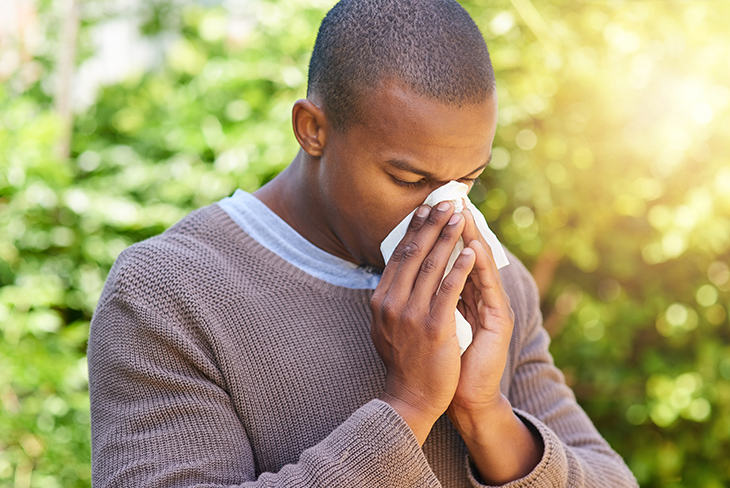Allergy alert

Do you become an itchy, sneezy, sniffing mess in certain seasons, or are you a walking symptom year-round? Here’s how to treat some of the most common allergies
People say love is all around, but for many of us, allergens are all around and we’re fighting a constant battle with the air we breathe. An allergy occurs when your body’s immune system develops an acute hypersensitivity to harmless substances in your environment, explains Dr Adrian Morris of the Allergy Clinic in Cape Town and Johannesburg. It can be dust mites in bedding, feather pillows, mould, grass and tree pollen in the breeze, or peanuts in a Thai curry. The possible result? Hay fever, eczema, rhinitis, asthma or even life-threatening anaphylaxis.
Control what you can
Avoid your known allergens and manage what you can’t control with medication, advises Dr Preba Pillay, an ear, nose and throat surgeon at Life Brenthurst Hospital in Johannesburg. ‘Because an allergy is for life, you should only treat it if you are symptomatic to the extent that it interferes with your lifestyle.’ Seasonal rhinitis is most common, particularly in spring, but can strike in autumn when dry wood is abundant. He recommends an antihistamine first, as it works within an hour and lasts for 24 hours. ‘If you aren’t symptomatic the next day, you don’t need to take it.’
The next option is a steroidal nasal spray to stabilise the mucosa of the nose and decrease reaction to allergens. This takes four to six hours to kick in and must be taken daily. Allergies are exposure related, so stop treatment when you’re either able to cope with the symptoms, or when the symptoms disappear.
For hay fever sufferers, ‘proactive, regular treatment works better than chasing symptoms, as your body is better prepared to fend off pollen,’ says Dr Morris. He recommends starting in early September with both a non-sedating antihistamine (generics include cetirizine, loratadine and fexofenadine) and a low-dose steroidal nasal spray, such as fluticasone (available on prescription) and inexpensive beclomethasone (available over the counter). Keep pollen at bay by closing windows during the day at home and in the car, applying Vaseline to the inside of your nostrils, changing clothing after a day out, and showering and washing hair. A daily teaspoon of raw, organic local honey – taken two months before the hay fever season begins until it ends – can help reduce symptoms, says Dr Morris.
Get professional advice
It’s advisable to consult a GP, who’ll check medical history to identify possible allergens, perhaps run a skin-prick test or radioallergosorbent blood test (RAST) and treat your allergies accordingly.
Be prepared
If you have a significant reaction to a food allergen (peanuts and tree nuts, milk, soya and shellfish are the most common), carry an epinephrine auto injection with you, advises Dr Pillay. It could save your life.
For an acute attack of allergy, he believes conventional medicine is the only safe option. However, ‘homeopathic doctors have a lot of success in treating allergies because they try to get the patient well overall, whereas clinicians treat the symptoms.’
Finally, help allergy-proof your children. ‘Allergies are switched on or off during the first year of life and early exposure to allergens turns them off,’ explains Dr Morris. Although one may inherit a genetic predisposition to allergies, the more a baby is exposed to pollen, germs, other children’s bugs, animals and food allergens, and the fewer antibiotics he or she is given in the first five years – in particular the first year – the less allergy-prone a child is likely to be.
Antibiotics destroy the gut microbes required for a healthy immune system, he explains. Harmful abnormal bacteria can develop in the bowel and the immune system may start attacking harmless substances in the environment, from food to animal hair. So eat nuts during pregnancy, feed your baby peanut butter in the first year, avoid antibiotics for young children whenever possible and don’t keep your house too clean – with the experts’ permission.
The information is shared on condition that readers will make their own determination, including seeking advice from a healthcare professional. E&OE. Life Healthcare Group Ltd does not accept any responsibility for any loss or damage suffered by the reader as a result of the information provided.

